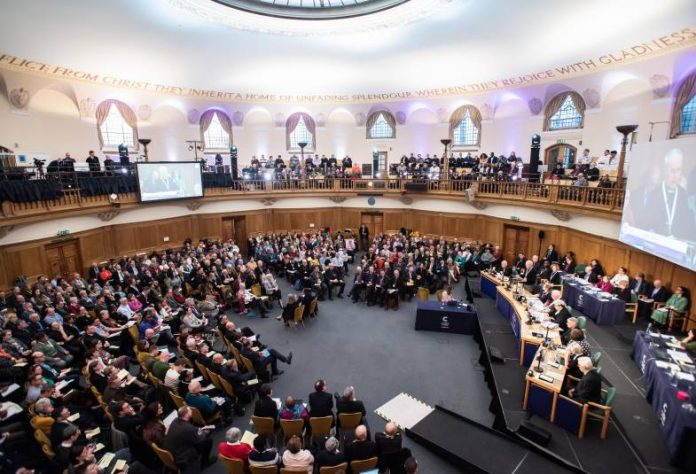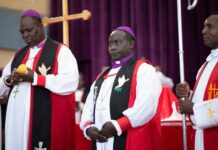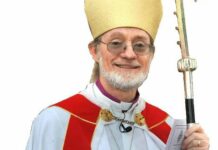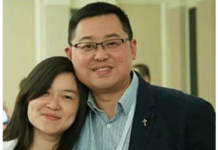In reflecting about anything in the Church of England, and especially in relation to General Synod, it is worth bearing in mind this mantra from the Troubles in Northern Ireland: ‘If you are not confused, you don’t really know what is going on.’
The newspapers seemed to be very clear what had happened:
The Church of England has approved blessings for gay couples for the first time. In a historic vote, the General Synod, the Church’s legislative body, voted to officially recognise same-sex couples on Thursday.
You can understand why they would understand the vote in that way—since the Archbishops of Canterbury and York have both used that language. Unfortunately, that is not what happened! The proposals that the bishops brought to Synod were that the doctrine of marriage, as a lifelong union between one man and one woman, would not change, but within the constraints of that they would propose some ‘Prayers of Love and Faith’ which might be used to bless those people in same-sex relationships of some forms or other (as yet unspecified), but not function as a proclamation of God’s blessing on the relationship itself. (Please refer to my opening mantra!). What Synod narrowly voted for, after about eight hours of debate on Wednesday afternoon and Thursday morning, was for the bishops to continue to work on this, with some serious qualifications. For ecclesiastical nerds, this is the wording of the final motion as amended:
That this Synod, recognising the commitment to learning and deep listening to God and to each other of the Living in Love and Faith process, and desiring with God’s help to journey together while acknowledging the different deeply held convictions within the Church:
(a) lament and repent of the failure of the Church to be welcoming to LGBTQI+ people and the harm that LGBTQI+ people have experienced and continue to experience in the life of the Church;
(b) recommit to our shared witness to God’s love for and acceptance of every person by continuing to embed the Pastoral Principles in our life together locally and nationally;
(c) commend the continued learning together enabled by the Living in Love and Faith process and resources in relation to identity, sexuality, relationships and marriage;
(d) welcome the decision of the House of Bishops to replace Issues in Human Sexuality with new pastoral guidance;
(e) welcome the response from the College of Bishops and look forward to the House of Bishops further refining, commending and issuing the Prayers of Love and Faith described in GS 2289 and its Annexes;
(f) invite the House of Bishops to monitor the Church’s use of and response to the Prayers of Love and Faith, once they have been commended and published, and to report back to Synod in five years’ time.
(g) endorse the decision of the College and House of Bishops not to propose any change to the doctrine of marriage, and their intention that the final version of the Prayers of Love and Faith should not be contrary to or indicative of a departure from the doctrine of the Church of England.
This amended motion was carried in each of the three ‘houses’ of Synod (laity, clergy, and bishops). Bishops voted for it by 36 to four, with two abstentions, while clergy voted for it by 111 to 85, with three abstentions. The house of laity approved it 103 to 92, with five abstentions.
As is characteristic of this whole debate, statement (a) is deeply ambiguous. Are we apologising for genuine failures of welcome, or are we apologising for the Church’s doctrine of marriage which is ‘according to our Lord’s teaching’? Jayne Ozanne put down an amendment to delete this because of the ambiguity, and I had some sympathy, but it was not carried.
Sam Margrave, who has been a vocal lay campaigner on this issue, had a number of detailed amendments, but most of those were not discussed since 25 members of the Synod did not stand to indicate their interest.
The first substantive amendment was presented by Busola Sodeinde, who is a Church Commissioner, asking for proper consultation with the Anglican Communion:
Before paragraph (d), insert
“( ) request the Secretary General of the Synod to consult personally the Primate of each Province of the Anglican Communion about the potential impact of the proposals in GS 2289 on its relationship to the Church of England, the life of the Province and the effectiveness of their mission, and report on the outcome of those consultations for consideration by this synod before the prayers are commended.”
This amendment was resisted by Sarah Mullally, the bishop of London, on something of a technicality—that the Secretary General (William Nye) was the wrong person to do this. (On this and other amendments, it would have been perfectly possible to edit the wording to avoid the technical problem—but Sarah did not initiate that conversation.) But as Busola pointed out, this decision will not just affect the Communion ‘over there’ (as it were) but the Communion ‘in here’, members of the Anglican Communion who are now part of C of E churches—including most strikingly in the HTB network:
There is an arrogance which I recognise, maybe unintended of, one time colonialism which insists that western culture is progressive while dissenting voices in Africa and everywhere else is silenced…I want to address the impending racial injustice, disunity and racial segregation in the church if we were to introduce same sex blessings without further consultation…I am worried that there may be an exodus of diverse communities from our parish churches and of having a profound impact on racial diversity which until now we have tried so hard to encourage.
It was in this context that Justin Welby gave his ‘tearful’ speech about violence faced by Christians around the world.
This isn’t just about listening to the rest of the world. It’s caring. Let’s just be clear on that. It’s about people who’ll die; women who’ll be raped; children who’ll be tortured. So, when we vote, we need to think of that…We must also do right here as part of the church Catholic.
So it seems that Justin thinks that appearing to bless gay marriages will harm Christians around the world—yet he rejected the amendment to fully consult, and supported the final motion at the end which was being interpreted to do just that. I confess, I struggled to make sense of that. Why would Justin vote for something that he himself says will harm Christians around the world?
In the chamber were two representatives of the Communion and the wider church. Samy Fawzy is Archbishop of the Episcopal/Anglican Province of Alexandria, and was invited to respond for the global Anglican communion:
We affirmed that resolution 1:10 of the 1998 Lambeth conference as the teaching on marriage and sexuality of the Anglican Communion. One of the clauses states, this conference cannot advise, legitimising or blessing of same sex unions, nor ordaining those involved in same gender unions… This is how we understand the scriptures tradition and reason of the Anglican Church… In our understanding of marriage and sexuality, there is a red line, we will never cross. Crossing this line of blessing same sex unions will alienate 75 per cent of the Anglican Communion and endanger the ecumenical and interfaith dialogue. This shift in practice will lead eventually to impaired and broken communion. We inherited the traditional Orthodox faith of the Church of England. So please, please do not surrender your unique position as the mother church of the Anglican Communion. It is your choice.
Archbishop Angaelos, of the Coptic Orthodox Church and co-chairman of the Anglican-Oriental Orthodox International Commission, told Synod:
Decisions here will impact the life of the Church outside this chamber; it will have implications. I am very aware of the difference between a blessing and Holy Matrimony—it is used here in the chamber and in the Church of England—but that distinction will not be readily understood by many around the world. The distinction will sound like a mere technicality.
So, with two important Communion and ecumenical voices pleading with Synod not to go forward, not only did Synod ignore them, but Justin Welby himself set their views aside. It is not very surprising that the Global South Fellowship of Anglicans, led by Justin Badi from South Sudan and claiming to represent 75% of the membership of the Anglican Communion, responded immediately:
The role of the Archbishop of Canterbury in leading the House of Bishops to make the recommendations that undergird the Motion, together with his statements, alongside the Archbishop of York, and the Bishop of London leading up to the General Synod, cause the GSFA to question his fitness to lead what is still a largely orthodox world-wide Communion.
In view of these developments, the GSFA will be taking decisive steps towards re-setting the Anglican Communion (as outlined in our ‘Communique’ following the 2022 Lambeth Conference). Orthodox Provinces in GSFA are not leaving the Anglican Communion, but with great sadness must recognise that the Church of England has now joined those Provinces with which communion is impaired. The historical Church which spawned the global Communion, and which for centuries was accorded ‘first among equals’ status, has now triggered a widespread loss of confidence in her leadership of the Communion.
A simple acceptance of Busola’s amendment might have avoided this rupture.
A number of further amendments aimed to qualify or clarify the motion, asking for confirmation of things that had been promised informally, including future consultation with Synod. Sarah Mullally resisted all but one of them (meaning that Synod would need to indicated it did indeed want discussion) even though she frequently said that she more or less agreed with the intent of the amendment. This did not endear her to Synod, and it felt as though someone had instructed her to follow this path.
The feeling of the chamber was expressed rather dramatically when Stephen Hofmeyr made a point of order: the fact that we were, on every amendment, taking a vote by houses meant that the bishops had, in effect, the right of veto on everything, and had used it on every vote so far. Was this really the way synod was supposed to work? If they were serious about listening to Synod, should they not abstain and allow the other two houses to decide? Stephen was only half way through his comment when the chamber burst into loud and prolonged applause, signalling widespread discontent with the way the bishops were behaving—and a number of bishops looked very disturbed by this.
Along the way, Andrew Selous, Conservative MP and Second Church Estates Commissioner, clarified the question of Parliament, the doctrine of marriage, and disestablishment. Despite the publicised meeting of 12 MPs who (it was claimed) were pressing for change, many others had been in touch with Andrew privately to state the opposite view—but were too fearful of media reaction to do so publicly.
It is not the job of parliament to decide what the doctrine of the CofE should be, but I am conscious that parliament’s patience may not be infinite and indeed there have already been cross party meetings of MPs to look at a private members’ bill to require the church to go further. Should synod decide to change marriage doctrine at a future point, a measure produced here going through parliament will provide the necessary legal opt-in. There is no need therefore for parliament to act independently to change the 2013 Marriage Act. Those here and in parliament who wish to force that or to remove the rights of conscience from equality law should be careful what they wish for. It would infringe on the settled principles of religious freedom, overturn a century of measured devolution from parliament to synod and be likely to call into question the rights and protections of conscience for other denominations and faiths as well as the Church of England. .. I was deeply moved by Archbishop Justin’s passionate plea for unity on Monday but I am struggling to see how we achieve that as the present position has managed to upset many on both sides of this debate and a small number of MPs tell me they believe churches will leave the Church of England over this issue.
Kate Wharton proposed an amendment, backed by a number of bishops, asking for further clarification before the prayers are brought back to synod, and I also table something very similar:
The Revd Dr Ian Paul (Southwell & Notts) to move: ‘Leave out paragraph (e) and insert:
“( ) Invite the College and House of Bishops to offer a full theological rationale for the proposed Prayers of Love and Faith, grounded in the Scriptures and the formularies of the Church, and which engages with the previous statements made by the House on the nature of marriage.”
Both of us presented our amendments as friendly, and both had written to Sarah inviting her support. Both were resisted. I spoke in support of mine thus:
To love someone is (according to Aquinas) to will the best for them. To do theology is to reflect carefully on the will of God for our lives—to reflect on what the divine best is for ourselves and for each other. If we do not do that, we are not truly showing ‘love’. Too often in this debate have we introduced a false dichotomy between pastoral care and theological thinking. That which God has joined let us not put asunder.
In Jesus’ prayer in John 17 he did not say ‘That they may be one’. Rather, he offered a threefold movement. First, he asked that God would ‘sanctify them in the truth; your word is truth’. And then he prays that ‘they might be one’, with the result that the ‘world might know’ the Father. In other words, this whole desire is rooted in theology (sanctification through the word of God) and directed towards missional fruitfulness. There is no institutional unity apart from theological coherence, and it is only this kind of unity, rooted in truth, which will be missionally effective.
We are deeply divided on this and I think in many parts of the church, trust and confidence in episcopal leadership is at a catastrophic low. We long to trust you, we long to follow your leadership, we long to be guided by you as our shepherds. But we cannot do that if you will not show us the theological working, how you are building on all the good work that’s been done in the past. If you do not do this I think we will find, now and in July, we are more divided than ever.
In resisting my amendment, Sarah Mullally claimed that the resources were in the LLF book, and that the work had been done. But neither of these things are true! The LLF material was never intended to provide the theological answers, and the answers to LLF Questions earlier in the Synod made it abundantly clear that none of the key thinking has even been begun! There is no clarity about the application of current doctrine; there is an unfounded claim of a difference between (civil) marriage and ‘Holy Matrimony’; there has been no explicit engagement with previous statements; there has been no discussion about the impact on the Communion; there has been no engagement with statement from other churches; there has been no reflection of the impact of these proposals on issues around church growth, clergy deployment, clergy well-being, or on evangelism amongst young people. It is difficult to see how anything can be brought to July Synod without all these things being addressed—but where will they find the time and resources to do this?
The one amendment that was accepted by Sarah, and then voted through, was from Andrew Cornes, and it became item (g) in the amended motion above. Yet again, all it was asking for was something that had already been promised informally—but it makes all the difference that it is now in writing, and agreed. Andrew presented it with this speech, which was one of the best of the debate:
In my ministry, I have walked and wept with many gay men. And I know this amendment will be painful for some to hear. I have no desire to hurt anybody. Please forgive me if I do.
One question has been persistently asked: Is the Church of England changing its teaching about sex? It’s a question every couple asking for the church’s blessing need to be clear about. It’s a question the congregation at any public service needs to be clear about. This amendment simply says: the Church is not changing its teaching.
Christ is the Lord of the Church. So the key issue is: What did Jesus teach? Jesus taught a lot about marriage and sex. He often met those who didn’t follow sexual norms. And he reveals himself as radically inclusive and radically conservative. When what Luke calls ‘a woman of the city’ kissed and anointed his feet, Jesus’ host thought ‘He should know she’s a sinner and spurn her’. He knew exactly who she was, and said she had poured her love on him. When he met a woman married 5 times and now cohabiting, she was astonished that he talked to her. But he did, and transformed her life.
So he was radically inclusive. He was also radically conservative. He confirmed Jewish teaching on sex and marriage, and made it more demanding. His teaching on remarriage surprised his disciples by its difficult demands. He called lustful thoughts sinful, and urged action to avoid sexual sin.
Inclusive and conservative: both are seen when they brought a woman committing adultery. He refused to humiliate or condemn her. And then he said: ‘Go and leave your life of sin’. It was sin, he said, and she must leave that sin now.
The Jews knew they were different in two ways: They didn’t worship idols, and sex was reserved for marriage. There was a general word for sex outside marriage—in Greek πορνεια—which Jesus said wells up from the human heart. For 7 years I have been researching for a book on Greek and Roman homosexualities, including many loving, committed, generous homosexual relationships. I have studied every extant Jewish writing on the subject between 200 BC and 200 AD. They are absolutely univocal. They say that any homosexual sex is sin. So when Jesus used the word translated πορνεια, all Jesus’ hearers will have assumed he included homosexual sex. If he did not regard that as sinful, he grossly misled his listeners.
So, as followers of Jesus the Church’s Lord, we must lovingly welcome all who enter our doors. We can joyfully offer Prayers to those who want to live sexually celibate lives. But surely—painful as this will be to some of us—we cannot bless a relationship which, in its sexual aspect, Jesus calls sinful. That has always been the Church of England’s teaching. And we owe it to all, and above all to Christ, to say that this teaching has not changed.
Acceptance of this amendment has made formal and explicit that the doctrine of the Church not only does not change, but cannot be seen to have change—the prayers ‘cannot be indicative of a departure from the doctrine of the Church.’ This constrains not only the content of the prayers themselves, but the context in which they are used and the way they are deployed.
For me, and many other ‘orthodox’ Anglicans in the chamber, one of the most heartening things about the debate was the quality of the contributions from those upholding the current doctrine. I append two at the end of this article. I do think there was a significant contrast with the speeches in support of the motion and rejecting the amendments. A large number of them focussed on the feelings of those affected, especially gay clergy who cannot express their emotional and sexual love as they would wish according to current doctrine. There is no doubt that these feelings need to be attended to—but the question is whether this forms the basis for the Church to determine its understanding of the teaching of Jesus. Other speeches lifted proof texts from Scripture in some bizarre ways—claiming that Jesus’ offer of ‘fulness of life’ must mean that no-one should be denied a sexual relationship, or that Paul’s acceptance of diverse approaches to food meant we could have the same approach to sex and marriage, even though Paul himself did not—or that Gal 3.28 implies that sex differences no longer exist. It is hard to see how any of these arguments could form a part of the bishops’ theological rationale for the Prayers.
One theme mentioned several times was the idea that not being able to marry would consign a person to a lifetime of loneliness. It was rather odd hearing those who reject the doctrine of the Church elevating marriage to such a pinnacle, as if it was the solution to all our problems—and very good to hear several single people saying that this was not true.
Where does this all leave the process and what lies ahead for the House of Bishops? It seems to me that there is more work to do than ever before—and both Synod Questions and the debate has exposed this more starkly than ever. The challenges include:
- How has the relation of sex and marriage been understood in previous statements?
- On what grounds could these consistent statements be changed or rejected?
- How does the Church of England engage with ecumenical statements, especially from the Roman Catholic Church?
- What are the implications for the Communion?
- What impact will the perception of what is being proposed have on the Church itself—on mission, church planting, plans for growth, clergy deployment and morale, and our work with young people?
- If these prayers are commended for use in a church service, in what sense is that not liturgical provision? So how can we avoid needing a two-thirds majority in Synod for their approval?
- Where did the claimed distinction between marriage and Holy Matrimony come from? How can that be sustained in the light of contrary evidence from all previous statements?
- Why were the proposals brought under Canon B5 (local use and decision) rather than Canon B2 (national approval), against the obvious legal conclusion, when these are being offered national and commended by the House of Bishops?
- How could the Pastoral Guidelines allow clergy to enter same-sex marriages, if the doctrine of the Church remains unchanged and ordination vows commit clergy to belief, uphold, teach, and pattern this doctrine in their own lives? How can there be any room for manoeuvre here?
- In addition, what comments and feedback were given by members of Synod in their reflections, and what difference will that make?
- In what context will the prayers be offered, with what rubric and introduction?
- How can all this be squared with the consistent teaching of Scripture? This cannot be lightly set aside, since Canon A5 delineates our doctrine as being ‘rooted in the Scriptures’, and Article XX of the XXXIX Articles states that ‘it is not lawful for the Church to ordain any thing that is contrary to God’s Word written.’
If this is any kind of ‘victory’ for those who wanted to moved forward, it looks very much like a Pyrrhic victory. ‘If we are victorious in one more battle with the Romans, we shall be utterly ruined’ (Plutarch’s account of Pyrrhus of Epirus).
Read it all at Psephizo



